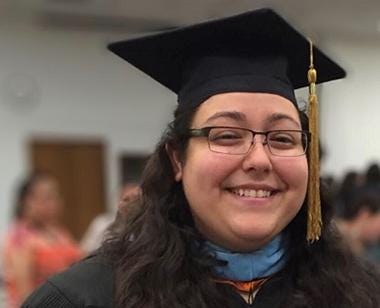Americans in Every Way Except on Paper
From DPE
This month, the Trump administration announced it was ending the Deferred Action for Childhood Arrivals (DACA) program, which provided temporary permission for over 800,000 undocumented young people brought to the United States as children to live and work in the country. The young people covered by DACA include teachers, journalists, entertainers, behavioral health specialists, and many other young professionals. As the place in the labor movement for professionals, the Department for Professional Employees’ (DPE’s) affiliate unions’ members bring to the table a diverse array of backgrounds, nationalities, and immigration experiences — including Dreamers.
DPE stands with the young professionals, union members, and all of those affected by the termination of DACA. We urge Congress to pass the Dream Act, which would ensure over one million people stay out of the shadows and are provided with work authorization, the most potent protection against immigration-based retaliation.
The stories below describe how DACA made the professional career aspirations come true for these young people. Through their work, these Dreamers are making our communities and economy better. We have all benefited from the DACA program and will continue to benefit with the passage of the Dream Act.
Jose Galvan, aspiring Stage Directors and Choreographers Society (SDC) member

Jose Galvan, theater professional and aspiring SDC member. Courtesy of Jose Galvan
Jose Galvan is a theater professional, aspiring member of the Stage Directors and Choreographers Society (SDC), and a DACA beneficiary. He came to the United States from Mexico as a two year old with his mother and brother. They decided to come to the United States to reunite with Jose’s father, who had been living, working, and paying taxes in California.
Jose was the first in his family to graduate high school, and earned a full, merit-based scholarship to attend the University of San Diego (USD). At USD, Jose discovered his passion for theater.
“I fell in love, because I learned as an artist I had a voice,” said Jose of his introduction to theater. “I could use art to start a dialogue, make people feel something, question something, make a difference.”
Jose went on to graduate with a bachelor’s degree in theatre arts and performance studies with an emphasis in directing. While a senior at the University of San Diego, Jose became the first artistic and literary intern for the Old Globe in San Diego, a theater modeled after Shakespeare’s Old Globe in London. Following graduation, Jose was offered a job in the Arts Engagement Department at the Old Globe.
Jose now has a career in theater. Most recently, he directed a show for children of military families that aimed to help them deal with the unique challenges they face with loved ones in the armed forces. The show toured military bases, armories, and armed services’ YMCAs. Jose is now working towards graduate school and getting his master’s degree in directing.
Jose spent essentially his whole life in the United States — it is all he knows. The impending loss of DACA means that Jose could lose his ability to work legally, his access to health insurance, his opportunity to pursue a MFA, and his home. The end of DACA also means the United States could lose someone who has already made important contributions to the country and is on a path to making many more.
Karen Reyes, American Federation of Teachers (AFT) member

Karen Reyes, teacher and AFT member. Courtesy of AFT
Karen Reyes is a DACAmented teacher and a member of Education Austin, part of the American Federation of Teachers (AFT). Karen came to the United States from Mexico at the age of two. She grew up the United States and always thought of herself as a typical American kid — since that’s who she was. However, once she realized she was undocumented, she began to hold back, frozen by fear.
“I held back from friendships, I held back from activities, I held back from applying to the universities that I really wanted to attend, because would they want me even with my status,” said Karen.
Fortunately, Karen was able to attend college and pursue her dream of working in education. She earned a private scholarship to attend the Deaf Education and Hearing Science program at the University of Texas Health Science Center at San Antonio.
In 2012, Karen was able to become a DACA beneficiary and teach children who are deaf and hard of hearing. Karen is helping these students and their families communicate and achieve their own dreams.
“DACA made me find my voice and made me be able to live without fear. DACA made me visible, it has empowered me and made it possible for me to come out of the shadows and fight for myself and for the other 800,000-plus Dreamers,” said Karen. “We must defend DACA because, after living here for 26 years, I am here to stay.”
Karen’s story is adapted from her “Becoming Visible” story previously published by AFT.
Jorge Corona, Writers Guild of America, East (WGAE) member

Jorge Corona, filmmaker, writer, and member of WGAE. Courtesy of Jorge Corona
Jorge Corona is a filmmaker and writer, a founding member of Fusion’s union for editorial staff, and a former DACA beneficiary. Jorge came to the United States from Mexico with his parents as an 11 year old. He earned admission to the University of Texas after performing well at school in San Antonio. Due to his immigration status, there was a lot of uncertainty about being able to pay for college because he was not legally eligible to work. Fortunately, Jorge found a way, mostly with the help of some scholarships and grants he was eligible for.
While in college at the University of Texas, DACA was announced, and Jorge was able to qualify. After he graduated, he was able to move to New York City and pursue his chosen career because of the employment authorization DACA provided. In New York City, Jorge began working for media outlets in a freelance capacity. He did a few jobs at Fusion, and was hired as a full-time employee soon after. Jorge participated in the successful campaign among Fusion staff to form a union with Writers Guild of America, East (WGAE) in 2015. Winning the right to negotiate with their employer meant Fusion’s staff earned a stronger say in what the company was doing. Many people in the newsroom earned their first raise because of the efforts of Jorge and his coworkers who participated in the organizing campaign.
While Jorge no longer is a DACA beneficiary, his story demonstrates how the program provides stability, protection and a way forward for Dreamers to pursue their career goals and contribute to our economy.
Selene Meza, Office of Professional Employees International Union (OPEIU) member
Selene Meza is a DACA beneficiary serving on the front lines of the opioid epidemic as a chemical dependency professional in Bellingham, Washington. Selene arrived in the United States with her family when she was 13. As a young teenage she knew she did not have documents, but at that time she did not know what that meant.
In high school, Selene realized that she was at a disadvantage because she was undocumented. She could not work summer jobs like her friends, and she didn’t think she could go to college. Fortunately, Selene was able to attend community college and then transfer to a four year school to earn her bachelor’s in psychology. Selene was the first in her family to graduate from college.
While finishing college, Selene initially qualified for DACA. The work authorization Selene received through DACA meant that she could put her degree to use. Selene went to work at a community behavioral health clinic, where she still works today as an addiction treatment counselor. Selene helps people fighting addictions to heroin and works with patients’ families. She is a member of the Office of Professional Employees International Union (OPEIU) Local 8.
As a DACA beneficiary, Selene has been able to contribute to her household, which includes her husband and two young children. The end of DACA without a legislative solution will not only pull an important resource away from the fight against the disease of addiction, but it will also make it difficult for Selene to provide for her family.
Esther Lee, Writers Guild of America East (WGAE) member

Esther Lee is a ThinkProgress reporter, member of Writers Guild of America, East (WGAE), and has been a beneficiary of the DACA program since 2012. When Esther was two years old, she escaped domestic violence with her mother by coming to the United States from Taiwan. Esther spent her childhood in California.
After she graduated from high school, Esther was able to attend New York University. She paid for her education with money earned working, along with financial assistance from family.
Esther earned her DACA approval in 2012. Her work authorization from DACA meant that she could pursue her journalism career.
“Coming out of the shadows meant that I was able to get a job that didn’t leave me at the whim of my employers,” Esther notes.
For Esther, the stability provided by DACA has proved instrumental in getting her where she is today as a reporter with ThinkProgress.
As these stories describe, Dreamers are Americans in every way. Dreamers are our neighbors, friends, and professional colleagues, and they are working to improve the place we all call home.
It’s time to make Dreamers Americans on paper too by passing the Dream Act. We urge you to help make this a reality by contacting your members of Congress and asking them to support the Dream Act.
***
Repostd from DPE

